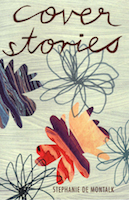
Cover Design
Sarah Maxey
Victoria University Press, 2005
In 2003, while in Poland promoting the Polish translation of Unquiet World, and researching The Fountain of Tears, I slipped on the marble floor of a hotel bathroom and injured my pelvis.
This accident goes unmentioned in the poem, ‘Warsaw’, but the story of a later trip to France for surgery relating to the injury is told in part II of the book.
Many of the other poems are concerned with seeking relief and healing in the imagination and memory, under cover of distraction or reflection.
WARSAW
This is the scarf I bought
in the Nowy Swiat –
silk, of symbolic design;
I wore is straight from the counter
through parks
and neo-classical palaces,
children playing descant
recorders in doorways,
reflections moving in and out
of the trees
like tramlines in autumn.
There were poets everywhere as
there would be,
swirling vowels around
on their tongues,
singing songs best sung
in the rain,
saying ‘Good evening,’
and ‘Thank you,’
and ‘Madame, as you can see,
I have a fever, please
may I use the telephone?’
There were pigeons too,
and painters,
and the ashes of Chopin’s heart.
This is the nail varnish – number nine
in quick dry enamel;
it might have been Perle
or Pink Ice,
Diamond Rose was also a consideration,
but I settled for Frolic
in honour of the mermaid
who lives in the Vistula
protecting the city
and crimson tapestry
in the foyer of the socialist realism hotel
in which I was staying,
from which I was stepping
with my index to fragments
and facades of importance,
to interiors famous for radium,
polonium and enlightened
government policy,
a sixteenth-century hospital,
a gunpowder despository,
the sabotage of forty million bricks
in the Palace of Science and Culture.
these are the shoes –
triple slim fitting,
as sleek as the herring oil
I drank after vodka,
as chic as the woman
with a fortune-telling canary
who placed her cards on a table
in front of a plate glass window
and said, ‘The road is cobbled,
you should carry spare parts
and check your bicycle frequently.’
They twinkled
on pavements for strolling
shining this way and that,
catching time, light,
a myriad possibilities:
the king rising from rubble,
sword and cross bronze
at the top of his column,
Copernicus stepping out of the past
with his manuscript
and celestial sphere,
the sky on his back.
A Best Book of 2005: The New Zealand Herald.
‘De Montalk has a fine sense of narrative restraint and irony. [...] The language is at once clear and Latinate, cultured, measured, controlled and
understated. It gathers in a sheaf of references not only to high art and history, but also to the sciences. I almost want to call it the poetry of good
manners – particularly for the way de Montalk transforms, deflects and even sublimates the pain of a serious accident [...] Cover Stories indeed.
The germinating subject of this series is, apparently, a broken pelvis: yet here, stoicism is an art form. [...] A single transferred epithet tells us
something of the mental fortitude it takes to use proverbs and elegant images to translate the experience: ‘That summer she lay altered/for months/
one eye on the floor .../a merciless light at the window’.
Emma Neale, ‘Delving Under the Covers’, The Dominion Post, 6 August 2005.
‘de Montalk’s tense, restrained minimalism is capable of packing a punch. [...] The poems about the author’s pelvic injury and subsequent surgery
are particularly vivid. [In ‘Hawkeye V4’] it is only de Montalk’s consistently spare style that makes this poem’s haunting evocation of the patient’s
powerlessness in the face of medical technology moving without sentimentality: at once profoundly unsettling [...] and oddly comic. This is a
remarkable achievement in the control of tone.
Hugh Roberts, New Zealand Listener, 10 September 2005.
‘It is always exciting to receive a book of poems by Stephanie de Montalk. [...] Her poems are compact but always dense with meaning.
Occasionally there are sharp scratches of sheer joy, at other times her poems are quite hypnotic. [...] Cover Stories is full of genuinely beautiful
poems [...] far more than simple cover stories.’
Hamesh Wyatt, Otago Daily Times, 2005.
‘ ... the assured and confident voice of a poet in full command of what she is doing – a poet whose easy, conversational mode is immediately
attractive, immediately evocative of her life – the ordinary and sometimes extraordinary events of everyday – and the lives of others.’
Alistair Paterson, Poetry New Zealand 31, 2005.
‘She knows about many things. [...] She writes with ease [...] She selects details which are fitting and which suggest more than they actually say.
[...] de Montalk can also write with dazzling simplicity. [...] To write with grace about sickness and surgery is a difficult thing to do. To write about
Lourdes without being sentimental or cynical is not easy either. [...] These thoughtful poems are well worth reading and reading again.
Rachel Bush, New Zealand Poetry Society Reviews, September 2005.
‘ ... language that is so carefully picked that it is at once delicate and lush. [...] a scent of European exoticism [...] a strong, unique voice [...]
‘Otherwise’, Real and Imagined’, ‘Hawkeye V4’ and particularly ‘Talking Pictures’ have a particularly interesting point of view. Simultaneously
submissive and astute, the characters in these poems [display] cool vividity: ‘he scoops the air/as if filling/a copper bowl/with hot water’ the narrator
of ‘Talking Pictures’ says, describing the actions of a surgeon across the other side of the world performing an operation via the telephone.’
Amy Brown, Salient, Issue 14, 11 July 2005.